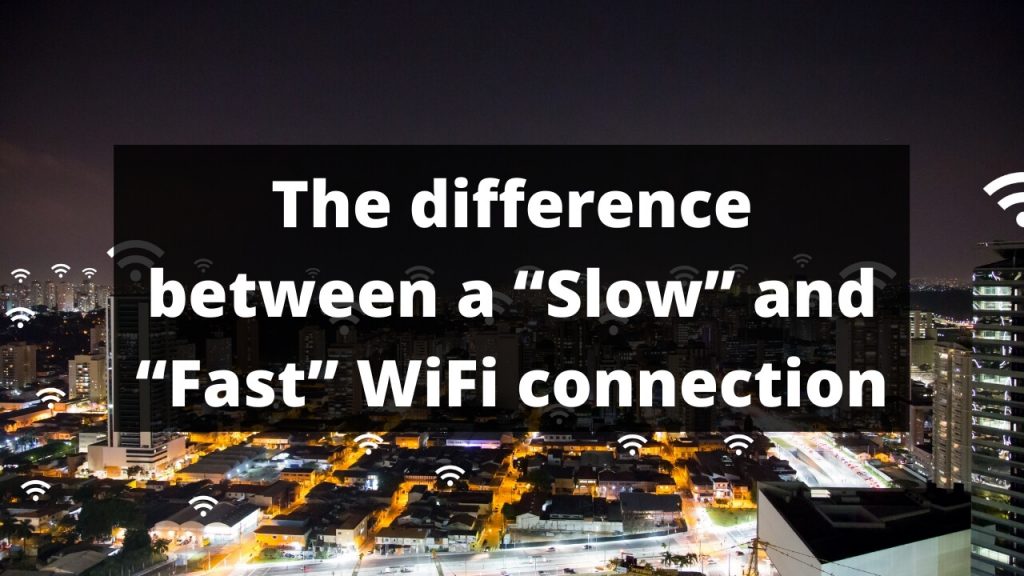The difference between a slow and fast WiFi connection is primarily determined by the speed at which data can be transmitted wirelessly between your device and the router.
Fast WiFi connection can refer to a connection that permits information transfer quickly, allowing for downloads and uploads, smoother video streaming, and quicker loading times for Internet webpages and other online content. This can noticeably improve the user’s experience, particularly for online activities requiring a fast connection, such as online gaming and video streaming.

The difference between a “Slow” and “Fast” Wi-Fi connection
Many of us have speed-related questions: namely, what is fast and slow Internet speed? Fast network connections are becoming must need thing in today’s society with almost everyone having a smartphone in their pockets. Everyone wants the fastest download speeds; no one wants to go with the slower side. But which speed we should maintain, and how to know if it’s fast enough or sluggish to handle moderator tasks? Have a look.
Internet speed is measured in megabits per second (Mbps). An average connection means a download speed of between 10 and 25 Mbps, and an upload speed of between 5 and 15 Mbps is perfect enough and easily endure all the difficult tasks and vice-versa the minimum you’ll go get a slower speed. For some connections, these numbers can be much higher or minor. Or you can say everything depends on the WiFi frequency that your router uses. The higher the frequency, the faster the speed.
How to Measure Our “Slow” and “Fast” WiFi Connection?
The ability to easily connect to Wi-Fi networks is one of the things most important in daily life, especially at home and at work. Therefore, we should monitor it from time to time to make sure the best use is made of our ISP.
So here is the way how you can test if your Wi-Fi connection is fast enough or not. In the result, you can also see the different elements for better info like “Your bandwidth”, “download speed”, “upload speed”, “your ping, latency, and jitter”. So, let’s start.
- Visit this tool page to measure if your internet is fast or slow
- Scroll down the page
- Just click on the GO button to test your internet with good accuracy
- Within 15 seconds, you are able to see how fast or how slow your Wi-Fi connection actually is.
Advantages of having a “Fast” WiFi connection:
Here are some advantages of having a fast WiFi connection in bullet points with each description within 100 characters:
- Faster downloads of files and software updates
- Reduced buffering during video streaming
- Quicker loading times for web pages and online content
- Improved online gaming experience with reduced lag and faster response times
- More reliable and stable connections for online activities
- Ability to connect multiple devices without slowing down the connection
- Better video and audio quality for video conferencing
- Increased productivity with the faster transfer of large files
- Ability to backup files and data to the cloud quickly and easily
- Improved smart home device functionality and responsiveness
- Easier access to remote work and learning opportunities
- The faster and more efficient online shopping experience
- Increased ability to work or study from home without interruption
- Improved streaming quality for music and podcasts
- Reduced frustration and stress from slow internet speeds
- Ability to download and stream high-definition video content
To determine which ISP provides an optimal speed for you, you should know How to conduct an internet speed test. That can be easily done with a private website or a speed test software tool. I made a separate article for a different telecom service; you should check that out also.
Conclusion
The differences between slow and fast wifi connections are clear. Slow wifi connections are characterized by their low download speeds, limited bandwidth and frequent disconnects. Fast wifi connections deliver higher download speeds, larger bandwidths and less overall disruptions. Understanding the distinctions between these two options can help consumers make an informed decision when it comes to selecting a service provider. Ultimately, choosing the right wifi connection will depend on individual needs and preferences, such as budget, purpose and location.